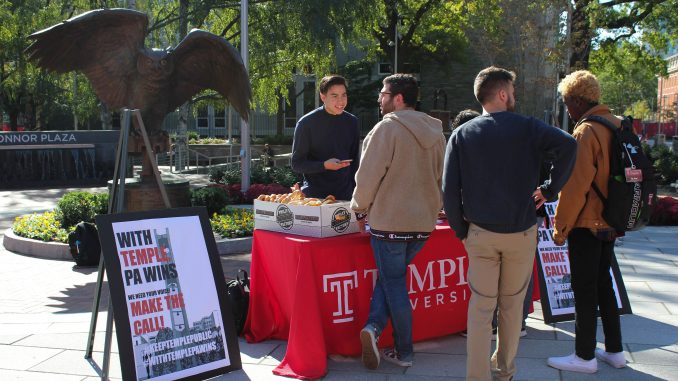
Temple Student Government hosted a phone bank event on Main Campus last week to encourage students to call their state representatives and ask them to vote in favor of the new state budget.
More than 415 students called their representatives to ask that they resolve the state’s $2.2 billion budget deficit and release Temple’s $150 million state allocation.
The phone banks were set up at three locations on campus: the Student Center, the second floor of the TECH Center and outside O’Connor Plaza, said Tyler Lum, TSG’s director of government affairs. Depending on the status of budget negotiations, more events could be planned.
“I’m hoping this is all we have to do,” Lum said. “But if [the budget] doesn’t pass…we need to escalate our efforts or just be diligent with what we’re doing now.”
In July, the Pennsylvania House of Representatives passed Senate Bill 328, which allocated about $150 million of the state budget to Temple for the 2017-18 school year. The budget will next go to the Pennsylvania Senate for a vote, but currently talks have stalled.
Temple and other state-related universities — University of Pittsburgh, Lincoln University and Pennsylvania State University — will not receive their allocated funds until the budget is balanced, according to the state’s constitution.
If Temple doesn’t receive its allocations, which account for 10 percent of the university’s budget, in-state tuition will rise by $12,000 per year, according to a letter to the editor in The Temple News by President Richard Englert.
Representatives from TSG and the university’s Office of Government Affairs helped students find their state representatives and their phone numbers and provided scripts for what students should say.
“We didn’t want anyone to stumble over their words,” Lum said. “It’s more appropriate for them to say, ‘We need you to vote on SB 328.’ I think that sends a stronger message.”
Lum said TSG and student governments at other state-related schools are increasing their advocacy because they’re concerned the state will cut their funding. If Temple continues to operate without state funding, the university will need to take out loans with high interest rates to cover operating costs, said George Kenney, the senior adviser to the president for government affairs.
At this point in the past, Temple and the other state-related schools usually have a good idea of whether or not they will be receiving their promised funds, Lum said.
“We’re kind of in an unknown state at this point,” he added. “In the past, the legislature has talked about defunding state-related schools, but they haven’t really directly addressed it now. … All the state-related schools are worried.”
Cailyn Hankins, a sophomore marketing major, said she knows other in-state students who are concerned that they wouldn’t be able to remain at Temple if tuition increased as a result of the budget not passing.
“It’s definitely important to reach out and tell [your state representatives] what you think,” she said.
She called two representatives from Doylestown, Pennsylvania. Her call to state Rep. Bernie O’Neill went to voicemail, but her second call to state Sen. Charles McIlhinney was answered by a staff member, who wrote down her name and email and promised to keep in touch, she said.
“I hope it worked,” she said. “I feel like they’re going to do whatever is best for the budget. I don’t really know what’s going to happen, but I really do hope this is going to work. Hopefully they’re hearing our voices.”
TSG first announced a letter-writing campaign late last month, but switched to phone banking after Parliament passed a resolution calling for TSG to help students advocate for Temple’s funding.
“Because [the resolution] passed, it seems like the majority of the students want to do it,” Lum said. “I don’t think anyone minds making a two-minute phone call if it means saving $12,000 a year.”
On Oct. 16, before the phone banks were set up, Englert sent an email to the university asking students to call their representatives and encourage them to come to TSG’s phone banks.
Matt Robinson, a sophomore advertising major and in-state student, said he visited the tables after receiving Englert’s email.
“I got two different emails, and I read them thoroughly,” he said. “They were telling me that I would have to possibly pay more than $10,000 a year for my tuition if I didn’t call. I figured I might as well, just because I’m an in-state student and I don’t want to go anywhere else. I might as well do what I can to stay here.”
Lum said the goal was to target representatives of the students’ hometowns, not just the ones who represent the Temple area, to emphasize the importance of state-related universities.
Robinson believes his phone call caused his representative to vote in favor of the bill, he said.
“I do know it had an effect because I did talk to the representative’s assistant…and he said the representative was going to vote for it,” he said. “I did talk to one of my friends about it afterward, and she said that when she called, she was the deciding factor.”
“She said when she called, the senator was just like, ‘Wow, alright, so this is like the 16th time I’ve gotten [called] today. I’m definitely going to have to vote for it,’” he added. “It’s cool to see that we’re actually having an effect on the bill itself.”



Be the first to comment